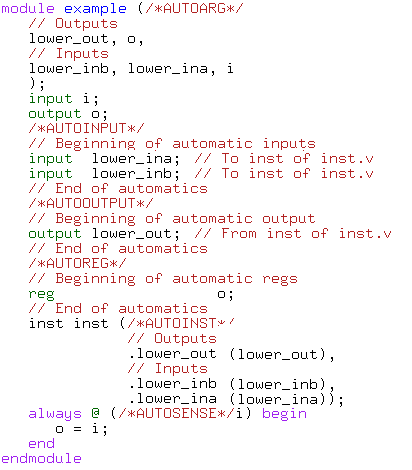This is the source distribution repository for verilog-mode, the Verilog editing and AUTOs package which is part of GNU Emacs (lisp/progmodes/verilog-mode.el).
Verilog-Mode supports syntax highlighting of SystemVerilog (IEEE 1800-2017), Verilog (IEEE 1364-2005), and the Universal Verification Modeling language (UVM). Verilog-Mode also has AUTOs which greatly accelerate maintaining interconnect, resets, and other boiler-plate code.
See https://www.veripool.org/verilog-mode for more information.
You have several installation options:
You may use the Verilog-Mode Source Tree. If using these sources you will need to "make" then install e/verilog-mode.el, not the verilog-mode.el in the top of the directory (which does not have the version number in it). In detail:
git clone https://github.com/veripool/verilog-mode make # Copy to somewhere in your Emacs "M-x describe-variable load-path" cp e/verilog-mode.el* /usr/share/emacs/site-lisp
(Do not use the github ZIP download option as this will not build correctly, the version number will be unknown.)
Verilog Mode is part of the ELPA (Emacs Lisp Package Archive). Using a recent version of Emacs:
M-x list-packages RET
then search for Verilog Mode:
C-s verilog-mode RET RET
then click on "Install".
Verilog-mode.el also comes included as part of Emacs 21 and later. This version always lags the version here, often by years. Please consider using the sources method instead.
The main purpose of this repository is the extended test suite. (Verilog-mode.el itself being both here and in the GNU Emacs repository.)
To run the tests, make sure both GNU Emacs and Xemacs are installed, then:
make make test
Under the hood this is (mostly) running 0test.el. This reads in each
file under tests/ directory, AUTOs, reindents, and compares the result
to the matching filename in the tests_ok directory.
Test failures generally look like this:
diff -c tests_ok/autoinout_ma.v e/t/autoinout_ma.v ***Golden Reference File ---Generated Test File --- GOLDEN_REFERENCE +++ CURRENT_BEHAVIOR ... - output sina, + output siuna, To promote current to golden, in shell buffer hit newline anywhere in next line (^P RETURN): cp e/t/autoinout_ma.v tests_ok/autoinout_ma.v; VERILOG_MODE_START_FILE=tests_ok/autoinout_ma.v make test_emacs
This indicates the generated output doesn't match what is in tests_ok. To
fix this make sure that the change is expected then do the cp shown to
update the golden references:
cp e/t/autoinout_ma.v tests_ok/autoinout_ma.v
Then make test again. The output also suggests a
VERILOG_MODE_START_FILE which can also be used to jump right to that
individual test inside the make test.
Verilog-mode itself is part of GNU Emacs, which is Copyright 2001-2024 Free Software Foundation, Inc. This package is free software; you can redistribute it and/or modify it under the terms of the GNU General Public License Version 3.
The Verilog test files unless specified otherwise are released into the public domain.

